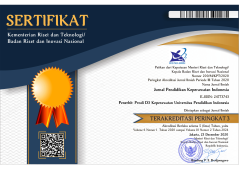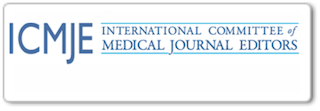The Relationship Organizations Climate and Workplace Bullying Among Nurses
Abstract
Bullying in the workplace is one of the psychological problems often experienced by nurses in the workplace that hurts individuals and organizations. Incidents of workplace bullying are common in highly stressful jobs. This study aims to find out the relationship between organizational climate and workplace bullying among nurses. This study used a cross-sectional, descriptive study design. There were 235 nurses involved as participants taken with a proportional random sampling technique. To assess bullying among nurses in Bengkulu by using a Negative Action Questionaire-Revised (NAQR) instrument. The results showed that of 235 nurses, there were (37.4%) of nurses who experienced workplace bullying. Three bullying actions most frequently reported were experienced by nurses, is getting excessive workload, given work tasks that are not following their competence, and given the job by the target deadline is not possible. A total of (44.3%) of nurses said working in an environment with a less good organizational climate. There is a relationship between the organizational climate of bullying to nurses in the workplace with a value of p = 0.000. An excellent organizational climate accompanied by a clear division of tasks can avoid conflicts and can prevent bullying in the workplace.
Keywords
References
Akar, N. (2013). Relationships among Perceived Job Stressors, Workplace Bullying and Job Stress in the Health Care Services in Turkey: A Structural Equation Modeling (SEM). International Journal of Humanities and Social Science, 3(14), 248–257.
An, Yuseon & Kang, J. (2016). Relationship between Organizational Culture and Workplace Bullying among Korean Nurses. Asian Nursing Research, 10(3), 234–239.
Einarsen et al (2011). Bullying and Harassment in the Workplace. The concept of bullying and harassment at work: the European tradition. In Bullying and Harassment in the Workplace : Developments in Theory, Research and Practice (S. Einarsen, H. Hoel, D. Zapf & C.L.Cooper eds), 3–41.
Einarsen, S., Hoel, H., & Notelaers, G. (2013). Work & Stress: An International Journal of Work, Health & Organisations Measuring exposure to Bullying and Harassment at work : Validity, Factor Structure and Psychometric Properties of the Negative Acts Questionnaire-Revised, (July 2013), 37–41.
Etienne, E. (2014). Exploring Workplace Bullying in Nursing. American Association of Occupational Health Nurses, 62 (1), 6–11.
Iftikhar, M., & Qureshi, M. I. (2014). Modeling the Workplace Bullying the Mediator of “Workplace Climate-Employee Health” Relationship. Journal Of Management, 4(1), 96–124.
Johnson, S. L. (2015). Workplace Bullying Prevention: a Critical Discourse Analysis. Journal of advanced nursing, 71(10), 2384-2392.
Neyens, I., Baillien, E., Witte, H. De, & Notelaers, G. (2007). Pesten op het werk: risicofactoren in werk en organisatie, (4), 306–320.
Salin, D., & Hoel, H. (2012). Organisational Causes of Workplace Bullying. Bullying and harassment in the workplace: Developments in theory, research, and practice, 2, 227-243.
Tambur, M., & Vadi, M. (2012). Workplace Bullying and Organizational Culture in a Post Transitional country. International Journal of Manpower, 33(7), 754–768.
Vessey, J.A. et al. (2012). Bullying of staff in the workplace a preliminary study for developing personal and organizational strategies for the transformation of hostile to healthy workplace environments. Journal of professional nursing, 25(5), 299-306.
Yayah & Hariyati. (2015). Iklim Kerja Berkontribusi Terhadap Kepuasan Kerja Perawat. Journal Keperawatan Indonesia, 18(2), 72-80.
Yokoyama, M., Suzuki, M., Takai, Y., Igarashi, A.,Noguchi-watanabe, M., & Yamamoto-mitani, N. (2016). Workplace Bullying Among Nurses and Their Related factors in Japan: a cross‐sectional survey. Journal of clinical nursing, 25(17-18), 2478-2488.
DOI: https://doi.org/10.17509/jpki.v8i1.45214
Refbacks
- There are currently no refbacks.
Jurnal Pendidikan Keperawatan Indonesia(JPKI) published by Indonesia University of Education. JPKI is licensed under a Creative Commons Attribution-ShareAlike 4.0 International License.
Office :
Nursing Department. FPOK UPI.
229, Dr. Setiabudhi Street. Bandung 40154
West Java , Indonesia
E-mail : jpki@upi.edu

_.png)
_.png)
_.png)











